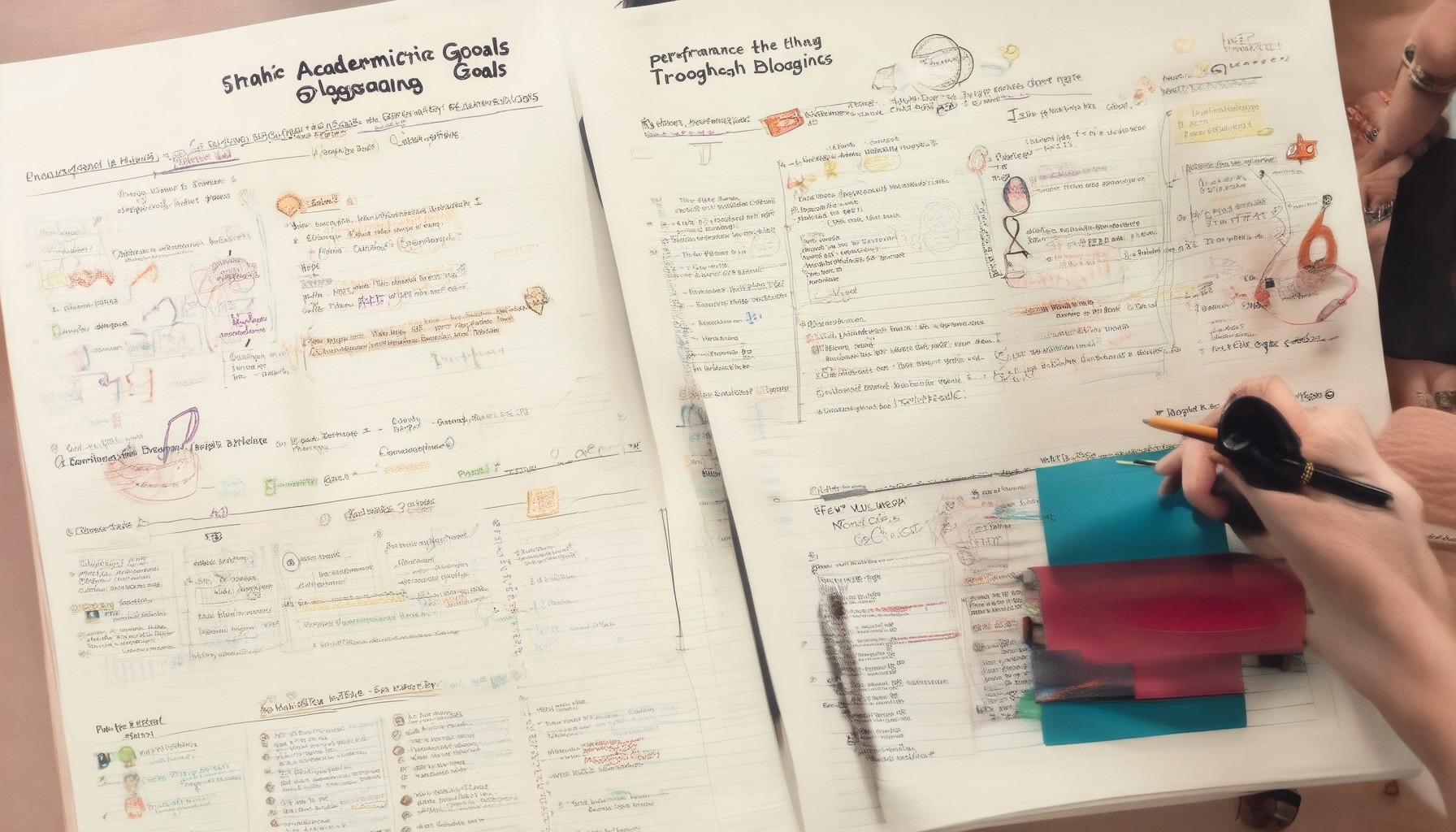Setting academic performance goals is essential for students and educators alike, as it provides a clear roadmap for success. However, achieving these goals can often feel overwhelming, especially when trying to balance rigorous studies with other responsibilities. This is where blogging emerges as a powerful tool, offering not only a creative outlet but also a structured approach to tracking progress and staying motivated. In this article, we explore how blogging can serve as an effective medium for setting and achieving academic performance goals, providing practical strategies, examples, and insights to help you get started. From understanding the role of blogging in academic success to learning how to set SMART goals and track progress, we delve into the various ways blogging can transform your academic journey. Whether you’re a high school student aiming to excel or a teacher looking to inspire your class, this guide will equip you with the knowledge and tools needed to succeed. So, let’s dive in and discover how blogging can be your key to unlocking academic excellence.
Top Strategies for Enhancing Academic Performance Through Dedicated Blogging
- Establish a Regular Study Schedule: Dedicate specific weekly times to review and summarize key concepts in blog-style entries to reinforce memory and understanding.
- Engage in Active Learning: Transform lecture notes into detailed summaries by adding interpretations and questions to enhance retention and critical thinking.
- Develop Comprehensive Study Guides: Create organized guides with sections and bullet points for quick, easy navigation during reviews.
- Actively Teach Concepts: Write explanatory tutorials to deepen understanding and master the material effectively.
- Utilize Digital Flashcards: Create and test flashcards to aid memory reinforcement through spaced repetition.
- Foster Collaboration: Share notes and discuss with peers to enrich learning experiences and gain diverse perspectives.
- Implement Reflective Practices: Regularly review and adjust study methods to continuously improve and align with individual learning styles.
Setting Academic Performance Goals for Your Blog
To effectively set academic performance goals for your blog, follow these organized steps:
- Define Clear Objectives
- Specify your primary goal, whether it’s increasing traffic, enhancing content quality, or boosting engagement.
- Align goals with your blog’s mission and audience needs.
- Apply SMART Goal Framework
- Specific : Clearly articulate what you aim to achieve, e.g., “Improve blog posts by 30% in six months.”
- Measurable : Use metrics like page views, social shares, or comments to track progress.
- Achievable : Set realistic targets, such as writing three posts weekly or increasing SEO traffic by 25% quarterly.
- Relevant : Ensure goals support your blog’s purpose and audience.
- Time-bound : Set achievable deadlines, like completing a series in two months or launching a podcast in six weeks.
- Self-Assessment
- Identify strengths, such as niche expertise, and weaknesses, like consistency issues.
- Create goals leveraging strengths, e.g., curating expert guest posts if you excel in research.
- Actionable Steps
- Break goals into manageable tasks, like daily reading for improvement or weekly drafting sessions.
- Establish a routine, such as dedicating mornings to content creation or Mondays to plan the week.
- Accountability Strategies
- Share goals with a mentor or friend for support and accountability.
- Join blogging communities or groups to stay motivated and gain feedback.
- Progress Assessment
- Monthly reviews to evaluate goal achievements and adjust as needed.
- Document successes and challenges to identify areas for continuous improvement.
- Milestone Celebration
- Celebrate achievements, such as publishing a popular post or reaching a page view milestone.
- Recognize personal growth and content improvements over time.
- Stay Inspired
- Explore successful blogs and online communities for inspiration and ideas.
- Network with fellow bloggers to collaborate and learn from their strategies.
- SEO Optimization
- Set a goal to learn SEO basics and implement strategies like keyword usage and meta descriptions.
- Aim to improve your blog’s loading speed and mobile-friendliness.
- Competitor Analysis
- Analyze competitors to identify gaps and opportunities in your niche.
- Differentiate your content by offering unique perspectives or in-depth analysis.
- Resource Utilization
- Use SEO guides and editing tools to enhance content quality and performance.
- Engage with blogging platforms and forums for additional support and resources.
How Can Blogging Help in Setting Academic Performance Goals?
Blogging offers a powerful medium for students to reflect on their academic journey, track progress, and set meaningful goals. Here’s how it can enhance academic performance:
- Reflective Writing:** By documenting thoughts and experiences, students gain clarity on strengths and weaknesses, aiding in goal-setting and strategy development.
- Goal Tracking:** Students can define short-term and long-term objectives, monitor progress, and adjust strategies as needed through regular blog posts.
- Feedback and Insight:** Sharing reflections can attract comments from peers or mentors, providing valuable feedback and fresh perspectives.
- Collaborative Learning:** Engaging with others online can foster a sense of community, offering support and ideas for overcoming challenges.
- Accountability:** The act of publishing content creates a commitment to follow through on goals, serving as a motivational tool.
- Progress Visualization:** Over time, students can see their growth and achievements, reinforcing motivation and confidence.
- Portfolio Development:** A blog serves as a digital portfolio, showcasing academic journey, skills, and accomplishments for future use.
For more insights, explore Enroll Maven’s guide on achieving academic excellence through strategic planning and goal-setting.
Strategies for Improving Academic Performance Through Blogging
Blogging can be a powerful tool for enhancing academic performance. By consistently creating and curating content, you can develop critical thinking, organizational skills, and subject expertise. Here are proven strategies to maximize your academic benefits through blogging:
1. Leverage Blogging for Learning
- Document Your Thoughts:** Use your blog as a journal to record ideas, reflections, and insights during lectures or independent study sessions.
- Share Insights:** Regularly publish posts that summarize key concepts, analysis, or solutions to problems you encounter in your studies.
- Engage with Content:** Comment on thought-provoking articles or videos to deepen your understanding and explore diverse perspectives.
2. Stay Motivated and Organized
- Set Goals:** Define short-term and long-term objectives for your blogging journey and track your progress weekly.
- Time Management:** Allocate specific blocks of time for researching, writing, and editing content to maintain consistency.
- Track Progress:** Use analytics tools to monitor your blog’s performance and identify areas for improvement.
3. Engage with Peers and Experts
- Build a Community:** Encourage discussions in your blog comments or through social media to connect with fellow learners and experts.
- Network with Experts:** Guest post or invite scholars to contribute to your blog, expanding your professional network.
- Learn from Others:** Read and analyze successful blogs in your field to understand effective writing techniques and content strategies.
4. Optimize for SEO and Visibility
- Keyword Research:** Use tools like Google Keyword Planner to identify relevant terms and phrases that align with your academic interests.
- Meta Descriptions:** Craft compelling meta descriptions to attract clicks and improve your blog’s visibility in search results.
- Internal Linking:** Link your blog posts strategically to guide readers to related content and improve SEO performance.
5. Showcase Your Expertise
- Build a Portfolio:** Use your blog to showcase your academic work, projects, and research findings for potential opportunities.
- Celebrate Achievements:** Highlight milestones, publications, and recognitions to demonstrate your growth and impact.
- Stay Updated:** Keep your content fresh by regularly discussing trending topics and breaking news in your field.
6. Analyze Competitors and Adapt
- Study Successful Blogs:** Analyze leading education blogs to identify best practices and areas for improvement in your own writing.
- Adapt Strategies:** Tailor your approach based on the strengths and weaknesses of competing platforms to stay ahead.
- Focus on Quality:** Prioritize high-quality, original content to differentiate your blog and attract a loyal audience.
7. Utilize Educational Resources
- Enroll Maven:** Explore Enroll Maven for valuable tips, articles, and tools designed to support academic success.
- Other Platforms:** Consider using platforms like StudyCram or ScholarlyNest to discover additional resources and strategies for improvement.
- Stay Informed:** Keep up with the latest trends and innovations in education by following reputable sources and influencers.
8. Enhance Writing Skills
- Practice Regularly:** Write daily to improve your clarity, coherence, and argumentative skills.
- Edit Thoroughly:** Proofread your posts multiple times to ensure accuracy and professionalism in your writing.
- Seek Feedback:** Share your work with peers or mentors to receive constructive criticism and identify areas for improvement.
By implementing these strategies, you can transform your blog into a dynamic tool for academic growth, personal development, and professional advancement. Start today and unlock your full potential!
Top Strategies for Enhancing Academic Performance Through Dedicated Blog Posts
To maximize academic performance, incorporating dedicated blog posts into your routine can be highly effective. Here are some proven strategies to help you achieve your goals:
- Consistent Study Schedule : Establish a regular study schedule and stick to it. Dedicate specific times each week to review course materials and summarize key concepts in blog-style entries. This consistency helps reinforce memory and understanding.
- Active Learning : Transform lecture notes into detailed summaries by adding your own interpretations and questions. This active learning process enhances retention and critical thinking skills, much like how interactive blog posts engage readers.
- Create a Study Guide : Write a comprehensive study guide for each subject or module. Organize it like a blog post with sections, subheadings, and bullet points for easy navigation. This guide becomes a valuable resource for quick reviews.
- Teach What You Learn : Actively teaching concepts to yourself or others can deepen understanding. Write out explanations as if you’re creating a tutorial blog post, ensuring clarity and mastery of the material.
- Use Flashcards Digitally : Create digital flashcards by summarizing key points from your blog-style notes. Test yourself repeatedly to reinforce memory, leveraging the spacing effect for long-term retention.
- Collaborate and Share : Start a discussion thread or forum where you can share your blog-style notes and ask questions. Collaborative learning enhances comprehension and provides diverse perspectives.
- Reflect and Improve : After each study session, reflect on what worked and what didn’t. Adjust your methods accordingly, refining your blog-style notes to better suit your learning style.
By implementing these strategies, you can create a powerful system for enhancing academic performance through dedicated blog posts.
Strategies for Setting Academic Performance Goals Through Blog Writing
Effective blog writing can be a powerful tool for achieving academic success. Here are some key strategies to help you set and meet your goals:
- Research Thoroughly:** Start by conducting extensive research on your topic. This ensures your blog posts are well-informed and contribute valuable insights to your field.
- Organize Your Ideas Logically:** Before writing, outline your main points and structure your content in a coherent manner. This helps in delivering a clear and persuasive message.
- Communicate Clearly:** Aim to write in a concise and articulate manner. Use academic language appropriately while ensuring your ideas are easy to understand.
- Stay Organized:** Maintain a consistent writing schedule and use tools like planners or digital calendars to track your progress and meet deadlines effectively.
- Collaborate and Share:** Consider guest blogging or collaborating with peers to gain diverse perspectives and improve the quality of your writing.
- Use Technology Wisely:** Leverage tools like grammar checkers, citation managers, and plagiarism detectors to ensure your work meets high academic standards.
- Reflect and Improve:** Regularly review your blog posts and seek feedback from mentors or peers to identify areas for improvement and enhance your writing skills.
By incorporating these strategies into your blog writing routine, you can effectively set and achieve your academic performance goals while contributing meaningfully to your field.
Academic Performance Goals Achievable Through Consistent Blogging
Blogging consistently can significantly enhance various aspects of academic performance, addressing several key areas that contribute to student success. Here’s a breakdown of the achievable goals:
- Improved Time Management:** Regular blogging encourages students to allocate specific times for writing, research, and reflection, fostering better organization and adherence to deadlines, which directly impacts academic outcomes.
- Critical Thinking and Analysis:** Engaging in thoughtful blog posts sharpens analytical skills, enabling students to evaluate complex issues and present well-supported arguments, essential for excelling in academic writing and discussions.
- Enhanced Communication Skills:** Blogging provides a platform for practicing clear and persuasive communication, which is vital for succeeding in academic presentations, papers, and collaborative projects.
- Personal Brand Development:** Building a recognizable presence through blogging can boost confidence and establish students as thought leaders, facilitating future academic and professional opportunities.
- Motivation and Focus:** The routine of blogging keeps students engaged and committed, helping them stay motivated and focused on their academic goals amidst distractions.
- Reflective Practice:** Documenting academic journeys allows for introspection, aiding in identifying strengths, weaknesses, and areas for growth, thereby enhancing strategic planning and continuous improvement.
- Community Engagement:** Connecting with peers through blogs fosters a supportive network, offering feedback, inspiration, and encouragement, which can enrich the academic experience and provide a sense of belonging.
In conclusion, consistent blogging serves as a powerful tool for students to cultivate habits and skills that drive academic success, from improved organization to personal growth, making it a valuable practice for achieving long-term educational goals.









0 Comments